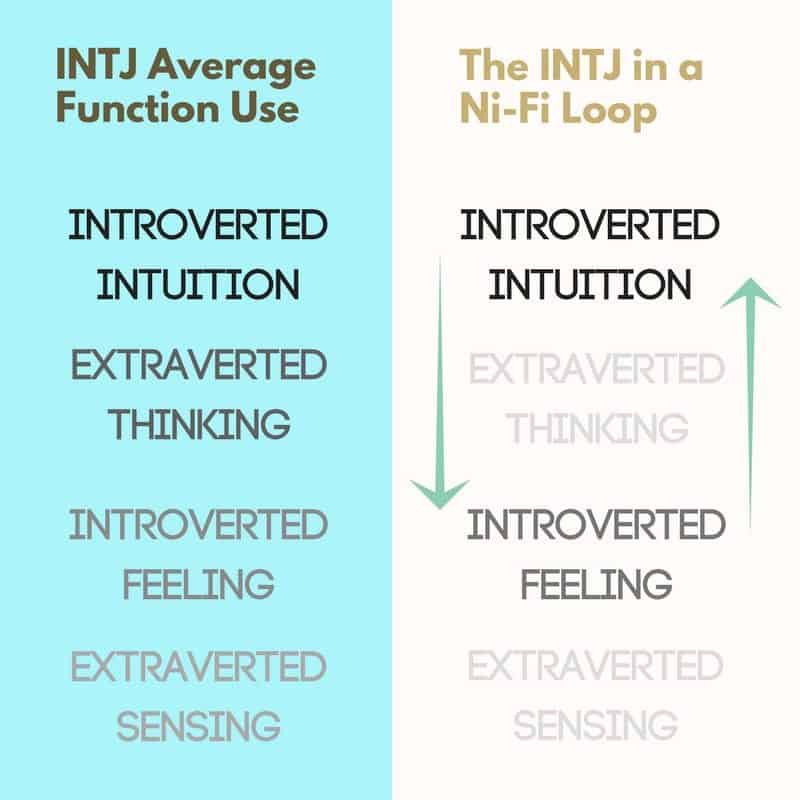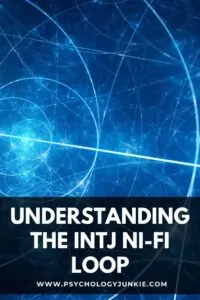The INTJ Ni-Fi Loop
Do you ever feel like there’s a part of you that doesn’t match type descriptions? A lot of INTJ descriptions make out the type to be very cold, aloof, and unfeeling. This can be surprising to many INTJs who actually feel very in touch with their feelings, values, and emotions.
INTJs are much more nuanced than most type descriptions would imply. Rather than being the cold-hearted rationals that most stereotypes paint them as, they are actually quite reflective, thoughtful, and even ethical.

In today’s article I want to explore a phenomena that happens to INTJs at times when they feel stressed or when they become unbalanced. INTJs going through a “loop” may not seem like your typical INTJ. They may also be struggling with a lot of confusion and frustration in their day to day life.
To understand the INTJ loop we need to look first at the INTJ cognitive function stack.
Not sure what your personality type is? Take our new personality questionnaire here. Or you can take the official MBTI® here.
Table of contents
Estimated reading time: 8 minutes

As you can see in the graphic above, an average INTJ will have a strong use of Introverted Intuition, followed by Extraverted Thinking, Introverted Feeling, and Extraverted Sensing. In the graphic, you can see that the influence of each function becomes lessened as you move down the function stack.
When an INTJ is looping, they have diminished use of their auxiliary thinking function. In fact, they bypass thinking and go straight to feeling. Then they loop back up to intuition, then back to feeling, over and over again. This is not a healthy state for the INTJ to be in and usually results in imbalanced decision-making, irrational fantasies, and loss of focus.
What is the Use of the Tertiary Function?
In most cases, the tertiary function aids the auxiliary function to ensure that decisions are being made with balance. Because the INTJ uses Extraverted Thinking (Te) as the auxiliary function, Introverted Feeling (Fi) balances Te and questions Te-motives and agendas. It ensures that the INTJ not only makes the most logical decision, but a decision that aligns with their personal values and morals. Fi gives the INTJ a determination to stay true to their own identity and individual moral code. INTJs who use Fi proficiently can take time to understand how their decisions affect not only themselves but the people around them.
Before we get into all the manifestations of the Ni-Fi loop, let’s figure out what Ni and Fi are.
Introverted Intuition (Ni)
Introverted intuition is an ability to understand how the world works through internal analysis, insight, abstract thought, and symbolism. Ni users have the ability to easily spot patterns and trends that will lead to a future outcome. They get strong hunches and “gut” feelings out of nowhere that are related to an unconscious synthesis of sensory data.
Introverted Feeling (Fi)
The ability to deeply understand one’s own emotions and values. Fi users have a strong moral compass and believe in being authentic and true to themselves and their identity.
Introverted Feeling in the INTJ
For the young INTJ, introverted feeling is often erratic and unpredictable. It’s not nearly as comfortable for them to use as intuition and thinking. They may repress negative emotions one day and then dwell on them the next. They may be hypersensitive to criticism one week and able to take criticism in stride another week. The tertiary function can at times be very proficient and at other times be very inept. Through life experience, maturity, and determination the INTJ normally develops more balanced use of the tertiary function in mid-life.
The Importance of Extraverted Thinking
Extraverted Thinking (Te) is what balances the INTJ’s dominant function, Introverted Intuition (Ni). Te takes all the insights, projections, and ideas of intuition and puts them into workable plans. Te is focused on objective logic, efficient decision-making, and putting plans out into the external world. Te works in tandem with Ni to make the INTJ strategic, planful, objective, organized, and decisive. When INTJs bypass Te they become lost in an unproductive state, withdrawn from the outer world and disinterested in making any difference in their environment.
Reasons INTJs Loop:
– As a defense mechanism.
The INTJ is defending themselves from the outer world and outer pressures by secluding themselves in their introverted functions.
– As a result of environmental imbalance
The INTJ has not been given sufficient opportunities to use the auxiliary function, and thus stays in a continual state of seclusion and focus on their introverted functions.
– The auxiliary function isn’t valued
If the INTJ favors the internal world to such an extensive degree that they don’t even try to develop their auxiliary function or get out into the world, they can loop.
What the INTJ Loop Looks Like
INTJs experiencing a Ni-Fi loop can get stuck in a world of theoretical visions compounded by subjective, emotional reactions. They are often called “conspiracy theorists” when this happens. They become suspicious of other people and the world at large. Fi feeds the INTJ emotion-based suspicious, and Ni will go to any lengths to justify those suspicions.
As an example, an INTJ in a loop could imagine that her friend doesn’t like her. Fi and Ni work together to make an emotional judgment that the friend dislikes her after the friend seems distracted and keeps excusing herself at a party. The same friend keeps canceling plans and showing up late to meetings with her. However, if Te and Se had been in the picture and functioning properly, Te would have been working with Ni, Fi and Se to see that
A) The friend’s distraction is a result of tiredness (the friend has morning sickness, is anxious about pregnancy)
B) The friend is canceling plans and showing up late because she’s feeling sick. Maybe friend needs some help or reassurance.
The above example may be kind of extreme, but it gets the point across. Fi feeds Ni feeling-based reactions and suspicions, and Ni fills in the gaps with any perceptions that might solidify those Fi-based suspicions. Ni doesn’t see the details (the friend has morning sickness, the friend has dark circles under her eyes, the friend isn’t eating normally). Ni just sees an impression (friend is gloomy, distracted, and mysteriously absent). Te and Se are left out in the cold and ignored and repressed so that Ni and Fi can continue feeding each other illogical fantasies and beliefs.
The Ni-Fi loop can also manifest when an INTJ comes up with rules or edicts that they enforce to everyone else. Their feeling-based values become “facts” and everyone must obey/adhere to them.
Other Ni-Fi loop traits: self-centeredness, insecurity, irrational behavior, preoccupation with a “vision” or idea of what is “really” happening, uncertainty, repeated grip stress reactions.
How INTJs Can Get Out of a Loop:
The first step to getting out of a loop is recognizing that you are actually experiencing a loop. This can be difficult initially because the dominant-tertiary loop can feel comfortable. It can seem natural because you’re still using two of your primary functions and in your preferred introverted direction.
Whatever you do, don’t go to Extraverted Sensing (Se) to solve the problem. Many INXJs do this, but switching to the inferior function can push you into the grip instead of a healthy functioning state. Going to Se to get out of a loop can cause you to become indulgent, impulsive, and overly focused on sensory experiences in an unhealthy way. To get out of a loop, your best option is to focus on your auxiliary Extraverted Thinking (Te).
Talk over your state with someone else and ask them if your projections make logical sense. Sometimes just saying your thoughts out loud (extraverting them) can help you to see what you might be missing or what logical missteps you’ve taken. Use Te to make a difference in the outer world. Structure and organize your day. Focus on attainable, logical goals and make a roadmap for how you will reach them. Play chess or another strategy game. Do things that force you to use logical, objective thought in an externalized way. Talk to people, work out plans, write out your plans, record yourself speaking through your ideas and visions and then listen to yourself and decide if what you’ve said makes sense. Just try to activate Te and re-introduce it into your daily life. As you do this you will start to get out of the loop and enjoy a more balanced, healthy, pro-active state.
What Are Your Thoughts?
Have you ever been in a loop? Do you have any suggestions for getting out of one? Let us know in the comments!
Find out more about your personality type in our eBooks, The INTJ – Understanding the Strategist, Discovering You: Unlocking the Power of Personality Type or The INFJ – Understanding the Mystic. You can also connect with me via Facebook, Instagram, or Twitter!
All About INTJs
Other Posts You Might Enjoy!
How You Use Extraverted Thinking – Based On Its Location in Your Function Stack
The Childhood Struggles of INTJs

Subscribe to Our Newsletter

Want to discover more about personality type? Get the inside scoop with Susan Storm on all things typological, along with special subscriber freebies, and discounts on new eBooks and courses! Join our newsletter today!















I have definitely been in this loop before. I always try to reach out to my Se. Which I now know that doing that is a bad idea (I knew it subconsciously but I just ignored it). Thanks for the article, it really helped 🙂
Amazing, great insights ! This article is really amazing. I am really stunned that any one can analyze things so deeply. Really great ! Keep it up.
I often schedule myself healthy activities considering each function. Fi I practice with journaling and contemplating my values. When I get in a loop, I might start cooking something with lots of steps to take. That way I can engage both Te and Se and get “out of my head” and doing something useful while at it. Other Te and Se activities are yoga, board games and other forms of exersice, bouldering being one of my favourites.
Sometimes I indulge in alcohol or become a hermit but I make sure to have a deadline when to get back to my regular rutine.
What an amazing article! I regularly experience such loops when in stress. It used to be ,much worse in my early 20s an when I suffer from depression. Actually, I have exhausted my psychologists in explaining them in detail and with sound logic why I am objectively right to feel worthless.
How did you get out of this depressive loop?
thank you for the information
I am in it since quite a while and I cannot stop judging myself. My Te is blocked & I cannot focus or conclude anything clearly; I feel ‘wishy washy’ and ‘stupid’ and it makes me despise myself. I am obsessed with my mental condition and fall ever deeper into self hatred. I cannot stand the way I behave because of that; it’s most shameful.
I feel like I am loosing my very self. But it’s validating to know that I am not imagining this & that it actually has a theoretical background.
same feeling, I feel disappointed of myself. I’m 25 years old and in don’t know what’s my goal, and what should i do on my life, i waste a lot of time.
It’s always a relief to read this article. Especially the intro who reassures me about INTJ not being all cold-rationnal beings. I think a lot of articles on or by INTJs are kind of extreme on how we are not supposed to be connected to Feelings. It’s more nuanced for me and as for others people i can read here. So thanks for that.
And on how the loop functions, i think it’s crucial information for me (us) to know and live a more healthy life. Knowledge is key.
Hello there! I have a question about the Ni-Fi loop. I’m an INFP and working on a story where an INTJ father’s much beloved and only son goes missing during a battle, and has been missing for a month. Everyone who has been sent out to find him has come back empty, and all captured enemy soldiers have honestly said they have no idea where he is. It is also extremely uncharacteristic of the son to disappear without a trace and become MIA.
Not only that, but the son’s mother died violently when he was just an infant, and his father loved his mother very, very, very much and still mourns her. His son is all he has left of her, and he loves him more than life itself. The father is also the general of the army his son fought in, and was in the same battle. His son went missing when he went to search for a fallen friend on the battlefield. His body has not been found, and the rest of the dead were accounted for, hence the MIA.
In the Ni-Fi loop in this scenario, how would the father/general respond? I sort of thought that he would just shut down, become reclusive, not lead his army, barely eat, barely sleep (and has nightmares), and the Ni would be imagining his son enduring all sorts of torture at the hands of the enemy that did retreat and was not captured, and that he would be crying in the confines of his own quarters as his fear over his son’s disappearance and the lack of answers (aka a problem he cannot solve).
And he would be blaming himself because he’s the general that led his son into the battle in the first place. He cannot think logically, which means he’s missing the fact that his son was captured but by a different enemy that used to be an ally, and thus does not think to go across that country’s borders to find and rescue him from a heavily-fortified prison in his Ni-Fi state.
Does this sound pretty accurate for an INTJ male caught in the Ni-Fi loop in such a scenario?
Thanks! This INFP writer really appreciates and looks forward to your answer! 😀
INTJ would probably over indulge. INTJ would seem to still be functioning as per normal but would be putting more of themselves into finding out what happened to their son. As they unravel they would become more reckless and more convinced in their own theories of what really happened. Often without consulting the facts. They absolutely would do something drastic if in a grip state. Which in this instance is more likely than coming back to Te. Although he could start using Te once he’s slipped into a grip state. An INTJ can only handle so much chaos.